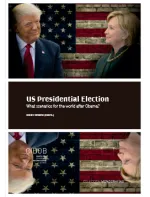Migrations: Between Democratic Continuity and Republican Upheaval

When it comes to US presidential careers, few issues have been and continue to be as important as migration. Though a recurring theme in recent years of the US electoral campaign, in 2016 it is becoming especially interesting due to the position taken by one of the candidates: Donald Trump.Both Republicans and Democrats (with significant differences) have attempted to attract and mobilise people of immigrant origin to their camps, given the significance of this group. But in this campaign Trump both seeks the electoral support of these voters and feeds his discourse with rejection of and confrontation with them.
The main lines of US migration policy are likely to change over coming years. Throughout her campaign, Hillary Clinton has noted that she will advocate continuity and follow in the footsteps of President Obama. This discourse is favourable towards the migrant population already settled in the country and those who require international protection, although it lacks content and specificity. If anything defines Barack Obama’s legislature on migration issues, it is that it has been heavy on intentions and promises and light on achievements. By way of example, the number of Syrian refugees accepted by the United States was 1,500 in 2015 and his intention in 2016 is to welcome just 10,000 more.
For his part, Donald Trump’s discursive coherence leaves no doubt of where he would look to go on this issue. Though some media and analysts have at one point or another sought to give him the benefit of the doubt (such as, for example, in the days prior to his famous visit to Mexico in September, which was read in terms of an approach to Mexican people and potential voters), what is certain is that the candidate himself has few doubts. His main proposals, which he has voiced since the start of the campaign, have been: to deport more than 11 million undocumented migrants, to put up a wall along the Mexico-US border, and to introduce an “ideological certification” test. On the refugee issue, his words leave little room for interpretation: “we have no idea who these people are, where they come from … I always say, Trojan horse”.
In any case, it should be recalled that the context has changed both at home and abroad. Inside the country the new president will have to battle with the unceasing growth of racist and xenophobic stances both in speech and in practice. The most recent protests led by African-Americans about police abuses against members of their community make a retraction of policies articulated around the “us and them” debate likely. This will end up being read in racial terms, which will in turn affect population groups of foreign origin.
The external factor adds to this. The United States continues to be one of the main targets for international terrorist groups. Since the attacks on September 11th 2001, sectors of US society have perceived migrants through the prism of national security and fear them as potential terrorists. Faced with this reality, both candidates will advocate a security interpretation that promotes the strengthening of external borders and internal control. Finally, as has already been happening Europe, both will find themselves obliged to grapple with increasingly active sectors of the extreme right striving to “protect” the homeland, values and culture from perceived external aggressors. In this case, it seems clear that the Republican candidate will have it easier.
But how will the European Union and its member states be affected by one candidate or the other winning? If Hillary Clinton wins, no significant change of the main lines of action pursued up to now should be expected. But if Donald Trump wins, various fronts will open up for the EU and its members. On the one hand, member states will at some point or other find it necessary to position themselves on the possible closure of US borders to third countries. This will be especially important for Spain and Germany, as they are priority partners and allies of Latin American countries. Similarly, a scenario of closer diplomatic relations between Latin American and the EU may be anticipated, as the influence of the United States, especially with countries like Mexico, would be diminished by the hostile action of a President Trump towards the Latin diaspora.
In the same way, the international agenda on key themes for Europe such as the refugee issue would be affected. The Republican candidate has on numerous occasions suggested that refugees pose a danger to national security. And he has specifically mentioned the possibility of terrorists infiltrating refugee resettlement programmes implemented by the US government. So if Trump wins we should expect a decline in US sensitivity over coming years to issues linked to migration in general and refugees in particular. Though it may be a long-term issue (as its solution cannot be short term), in this case it seems difficult to imagine another UN Summit for Refugees and Migrants supported or led by the US government as happened in September 2016.
Though Donald Trump’s anti-immigration position did not cause him too many problems in being elected Republican Party candidate in his party’s primaries, he may pay a heavy cost for his directly and openly confrontational discourse in the presidential elections. The mobilisation of the Latino vote, above all, but also that of the Asia-Pacific communities both in the registration process and participation on election day will be key to both candidacies. Trump and his discourse being materialised in concrete, controversial policies could lead to closer ties between the EU and third countries, especially in Latin America. The European Union would have to see itself as a lone actor when responding to large-scale phenomena such as the refugee crisis.